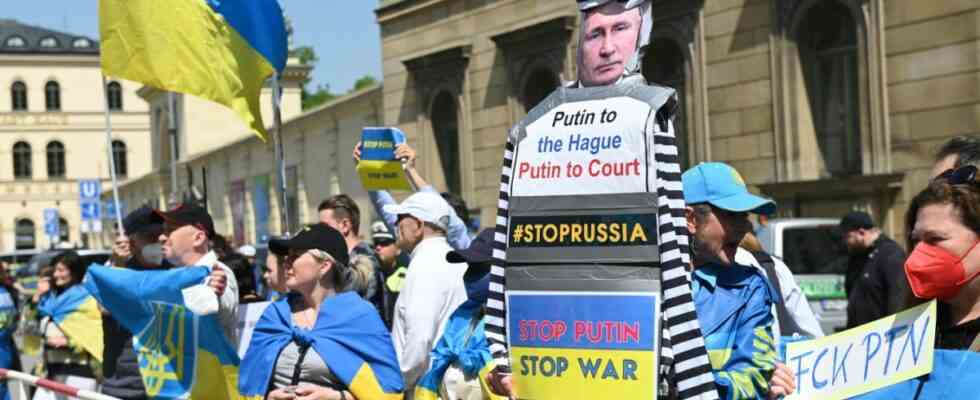About 130 Munich residents instead of the registered 700 demonstrated on Monday afternoon in Munich against the alleged discrimination against Russian-speaking people in Germany – up to 150 other demonstrators protested with chants and Ukraine flags against this first pro-Russian rally in Munich since the beginning of the war.
About 200 officers from the police headquarters, including mounted men and Russian-speaking state guards, were on guard. And also made sure that no forbidden images or symbols were shown. Earlier, the district administration department had banned the display of the “Z” symbol by Russian invading forces in Ukraine, which could constitute a criminal offense of condoning a war of aggression. Portraits of Stalin and Putin were also not allowed.
The latter was then seen: on the side of the counter-demonstrators. A life-size cardboard Putin was held up there. In convict clothes, combined with the request to put him on trial as a war criminal in The Hague. The counter-demonstrators accompanied the pro-Russian rally in front of the Feldherrnhalle with an almost constant whistling concert, with chants, with a sea of blue and yellow flags and with posters calling the Russian president a “killer” and his invading troops “Nazis”.
Russian flags here, Ukrainian flags there: The first pro-Russian rally since the beginning of the war mobilized the same number of demonstrators on both sides, namely 50 each.
(Photo: Stephan Rumpf)
In addition to the German and a Kazakh flag, many Russian flags were waved within the barrier. Speakers rushed to make clear what they mean by “Russian”: not a nation, but an idea. And the peoples of the former Soviet Union were incorporated into this idea – at least in the German-language, much shorter parts of the speeches – on May 9, which is traditionally celebrated in Russia as the day of victory over Nazi Germany. On the other hand, the speakers branded Nazi collaborators from now independent, Western-oriented states as un-Russian – including Stepan Bandera, who was murdered and buried in Munich.
This declaration of the alleged “Russian soul” may well have threatening aspects for counter-demonstrators from Russia’s neighboring states, which have long been independent – even if a speaker assured that nobody wanted war, but that one would be allowed to defend oneself. The polonaise and other dances of the pro-Russian rally participants immediately after a minute’s silence for the victims of the Second World War, interrupted by whistles, may not have changed that. Especially since one of the danced songs comes up with the following lines of text: “Beautiful Slav from Moldova … after our victory there will never be a war again. Mother Russia, we only stand guard for you. Off to the enemy …”
Six anti-Russian crimes have been registered in Munich since the beginning of the war
Not much could be learned about the alleged discrimination against the Russian language and traditions in Germany, against which the rally was actually directed, at least during the first third of the rally, which was scheduled to last four and a half hours. Apparently the Munich examples were missing. The Russian embassy, which for weeks has been offensively calling for such cases to be collected and reported, has not published any more incidents since April 11. Among the cases published up to that point, only a handful were from Munich.
This coincides with the information provided by the Munich police. Since the start of the Russian invasion of Ukraine, she has registered six criminal offenses against Russians living in Munich or Russian institutions. The Russian consulate general in Bogenhausen was particularly affected. It was attacked with bottles and bags of paint sprayed with writing equating Putin with Hitler, and was sent a suspicious white powder in the mail, which turned out to be harmless in the end .
The attack on a Russian woman living in Munich on March 14 at her apartment door is also regarded by the police as a politically motivated act. However, the background is still unclear. According to the victim, the two men who hit the Russian spoke accent-free Russian. According to initial information from the police, there were no such incidents on Monday afternoon. The ominous “Z” symbol was not sighted either.

